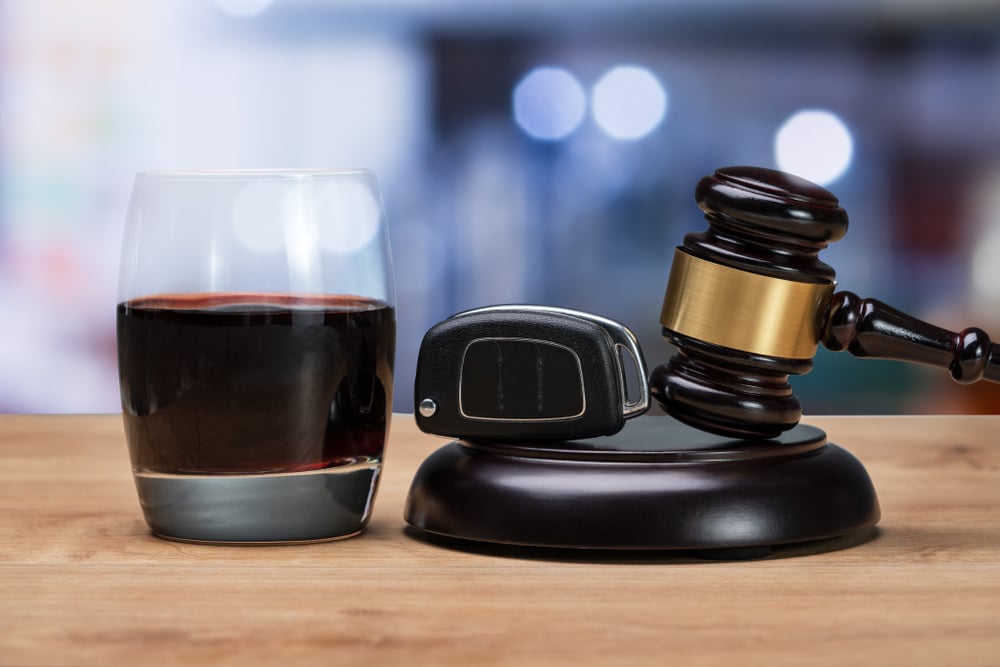
Alabama enforces strict DUI laws through a comprehensive system of detection, enforcement, and penalties. The state defines driving under the influence as operating a vehicle with a blood alcohol concentration (BAC) of 0.08% or higher for regular drivers, and 0.04% for commercial drivers. Law enforcement officers can also make arrests based on observed impairment, regardless of BAC levels.
The state employs a multi-agency approach to DUI enforcement, combining efforts of state troopers, local police departments, and sheriff’s offices. Alabama operates under implied consent laws, meaning drivers automatically agree to chemical testing when operating a vehicle on public roads. Refusal to submit to testing results in automatic license suspension and can be used as evidence in court proceedings.

0.08% or higher for regular drivers and 0.04% for commercial drivers

Yes

90 days

Conditional

Yes (0.15%+)
Alabama’s DUI landscape reflects a strong focus on prevention and enforcement, with particular emphasis on rural road safety where a significant portion of alcohol-related crashes occur. The state maintains a complex network of enforcement agencies, treatment providers, and administrative bodies working together to address impaired driving.
Counties and municipalities often enhance state-level efforts with local programs and additional enforcement measures. The state’s geographical diversity, from urban centers to rural communities, requires adaptable enforcement strategies and resource allocation. Recent years have seen increased focus on drug-impaired driving, particularly with the rise of prescription drug abuse and changing marijuana laws in neighboring states.
First-time DUI offenses in Alabama carry penalties including up to one year in jail, fines ranging from $600 to $2,100, and a 90-day license suspension. The state employs a tiered penalty system with enhanced punishments for higher BAC levels and repeat offenses. A five-year lookback period applies for determining repeat offender status.
Second offenses within five years result in mandatory minimum jail sentences of five days, fines up to $5,100, and one-year license revocation. Third and subsequent offenses carry increasingly severe penalties, including mandatory ignition interlock device installation, felony charges for fourth offenses, and extended license revocations.
Alabama law defines several aggravating circumstances that enhance DUI penalties. Driving under the influence with a minor under 14 in the vehicle results in doubled minimum punishment requirements and additional child endangerment charges. DUI crashes causing injury or death trigger felony charges under Alabama’s vehicular homicide and assault statutes, carrying potential prison sentences of up to 20 years.
Commercial drivers face particularly strict regulations, with lower BAC limits and automatic commercial license disqualification for first offenses. School bus drivers and those transporting hazardous materials face even stricter standards. The state also imposes enhanced penalties for DUI offenses occurring in construction zones or school zones.
Alabama utilizes a combination of sobriety checkpoints and saturation patrols as primary enforcement tools. Checkpoints must follow strict constitutional guidelines and operational protocols, including advance public notice and standardized screening procedures. These operations typically involve multiple agencies and are strategically located based on crash data and historical DUI patterns.
Law enforcement agencies conduct regular training for officers in standardized field sobriety testing (SFST) and advanced roadside impaired driving enforcement (ARIDE). The state maintains a network of Drug Recognition Experts (DREs) for complex cases involving drug impairment or multiple substances. Mobile command centers support large-scale enforcement operations, particularly during high-risk periods.
Alabama law enforcement agencies employ various technologies for DUI detection and evidence collection. Approved breath testing devices, including the Draeger Alcotest 7110 and Intoximeter EC/IR II, provide court-admissible BAC results. Preliminary breath testing devices support probable cause determinations during roadside investigations.
Blood testing protocols follow strict chain of custody requirements, with analysis conducted at certified laboratories. The state has begun implementing oral fluid testing devices for drug screening and exploring advanced detection technologies for both alcohol and drug impairment. Video documentation systems in patrol vehicles and body-worn cameras provide additional evidence support.
Alabama’s DUI treatment system operates through a network of court-approved providers offering various levels of intervention. Programs range from basic education courses for first-time offenders to intensive outpatient treatment for repeat offenders or those with high BAC levels. All programs must meet state certification requirements and follow standardized curricula focusing on behavior modification and substance abuse education.
The state emphasizes evidence-based treatment approaches, incorporating individual counseling, group therapy, and substance abuse education. Treatment providers must regularly report participant progress to courts and monitoring agencies. Program length and intensity vary based on assessment results and offense severity, with typical durations ranging from 12 to 52 weeks.
First-time offenders must complete a court referral evaluation and follow recommended treatment plans. The framework establishes different treatment levels based on assessment results, ranging from Level 1 (education) to Level 3 (intensive treatment). Repeat offenders face mandatory substance abuse evaluation and more intensive treatment requirements.
Treatment compliance is monitored through regular progress reports and random drug/alcohol screening. Failure to complete required treatment programs results in license suspension continuation and possible additional penalties. The framework includes provisions for indigent offenders, ensuring treatment access regardless of financial status.


Alabama employs multiple monitoring tools to ensure offender compliance with court orders and treatment requirements. Ignition interlock devices, mandatory for repeat offenders and high-BAC cases, provide real-time monitoring of alcohol use attempts. The state’s monitoring system includes regular check-ins with probation officers, random drug testing, and electronic monitoring for high-risk cases.
Compliance violations trigger swift consequences, including immediate license suspension and possible jail time. The state maintains a centralized database tracking compliance across multiple jurisdictions and agencies. Treatment providers and monitoring agencies coordinate closely to address non-compliance issues promptly.
Alabama’s Department of Public Safety (DPS) manages the administrative aspects of DUI cases independently from criminal proceedings. License suspensions begin automatically 45 days after arrest unless the driver requests an administrative hearing. The administrative process handles license suspensions, reinstatement requirements, and ignition interlock compliance monitoring.
The state maintains separate tracking systems for criminal and administrative penalties, ensuring comprehensive enforcement of all requirements. Administrative hearings provide opportunities to contest license suspensions based on procedural issues or evidence reliability. Success at administrative hearings requires strict adherence to filing deadlines and documentation requirements.
License reinstatement procedures require completion of multiple steps, including mandatory waiting periods, fee payment, and proof of program completion. Drivers must provide proof of SR-22 insurance coverage and complete substance abuse evaluation before license reinstatement. The process includes separate tracks for different violation types and circumstances.
Administrative appeals must follow specific timelines and procedures, with hearings conducted by DPS hearing officers. The state maintains strict documentation requirements for all administrative actions, affecting future eligibility for license privileges and treatment program requirements.
Alabama’s court system processes DUI cases through district and circuit courts, depending on offense severity. Initial appearances occur within 48 hours of arrest, where defendants receive charge information and rights advisement. Cases proceed through pre-trial conferences, motion hearings, and either plea agreements or trials.
The court process includes mandatory timeframes for various requirements, including evaluation, treatment, and device installation. Judges maintain some sentencing discretion within statutory guidelines but must impose mandatory minimum penalties. The system provides for specialized DUI courts in some jurisdictions, offering intensive supervision and treatment options.
The Alabama Law Enforcement Agency (ALEA) serves as the primary coordinator for DUI enforcement efforts statewide. The Department of Public Safety handles licensing and administrative penalties, while the Administrative Office of Courts oversees court procedures and compliance monitoring. The Department of Mental Health certifies and monitors treatment providers.
These agencies maintain interconnected systems for information sharing and coordinated response. The Governor’s Highway Safety Office provides additional oversight and funding for prevention programs. Local law enforcement agencies work closely with state authorities to ensure consistent enforcement and program implementation.
Alabama participates in the Interstate Driver’s License Compact, ensuring DUI violations are reported to other member states. The state’s DUI laws apply equally to out-of-state drivers, with mechanisms for enforcement across jurisdictions. Border state agreements facilitate information sharing and coordinated enforcement efforts with Georgia, Florida, Mississippi, and Tennessee.
Enforcement coordination includes special protocols for military personnel and international drivers. Interstate compacts govern evidence sharing, witness availability, and prosecution procedures across state lines. The state maintains specific procedures for handling cases involving drivers licensed in non-compact states.
Alabama faces unique jurisdictional challenges with multiple sovereign tribal lands within its borders. Agreements between state and tribal authorities establish protocols for DUI enforcement on tribal territories. Similar considerations apply to federal lands, including military installations and national forests.
Military installations maintain separate jurisdiction but coordinate closely with state authorities. Service members face both civilian and military consequences for DUI violations. The state works with federal agencies to ensure consistent enforcement while respecting jurisdictional boundaries.
First-time DUI offenders in Alabama typically face total costs between $8,000 and $15,000, including fines, legal fees, treatment costs, and insurance increases. Repeat offenders or cases involving accidents can see costs exceeding $30,000. These figures don’t include lost wages or long-term career impacts.
The state incurs significant costs for enforcement, prosecution, and monitoring programs. While fines and fees offset some expenses, the overall economic impact on public resources remains substantial. Court systems and treatment providers face ongoing resource challenges managing the volume of DUI cases.


DUI incidents in Alabama generate substantial societal costs through emergency response requirements, medical care, and property damage. Annual costs exceed $800 million when including indirect impacts like lost productivity and family disruption. Healthcare systems bear significant burden from DUI-related injuries, particularly in rural areas with limited trauma resources.
The ripple effects impact communities through increased insurance rates, strain on social services, and reduced economic productivity. Victim services, including counseling and rehabilitation programs, require ongoing public funding. These costs influence policy decisions and resource allocation for prevention efforts.
Alabama continues evaluating potential updates to DUI laws based on emerging research and technology. Current legislative trends focus on strengthening drug-impaired driving penalties and expanding monitoring options. Proposals under consideration include lower BAC limits and expanded use of ignition interlock devices.
The state is exploring innovative approaches to prevention and rehabilitation, including virtual court appearances and remote monitoring systems. These developments reflect growing emphasis on both deterrence and rehabilitation, particularly for first-time offenders.
Alabama increasingly incorporates advanced technology in DUI enforcement and monitoring. Digital breathalyzers with GPS tracking capabilities provide real-time compliance monitoring. Law enforcement agencies utilize body cameras and digital documentation systems to strengthen evidence collection and case prosecution.
The state is evaluating advanced roadside testing technologies for drug impairment detection, including oral fluid testing devices. Data analytics help identify high-risk locations and times for targeted enforcement. These technological advances improve accuracy while reducing administrative burden and strengthening case documentation.
Drug-impaired driving presents growing challenges for enforcement and detection, particularly involving prescription medications and marijuana. Alabama is expanding its Drug Recognition Expert program and implementing new testing protocols. The rise of ride-sharing services has influenced DUI patterns, requiring adaptation of enforcement strategies.
Autonomous vehicle technologies raise new questions about impairment definitions and liability. Mental health considerations receive increased attention in case management and treatment planning. The state continues adapting policies to address these emerging challenges while maintaining enforcement effectiveness.
Alabama maintains comprehensive prevention programs combining public education, school-based initiatives, and targeted awareness campaigns. The state coordinates efforts through multiple agencies, including public health and education departments. Programs target high-risk groups, including young drivers and repeat offenders.
Prevention initiatives include partnerships with businesses and community organizations. School programs begin in elementary grades and continue through college level. The state emphasizes peer education and practical demonstrations of impairment effects. Public awareness campaigns utilize multiple media channels and community events.
DUI convictions can severely impact employment opportunities, particularly in positions requiring driving or professional licensing. Commercial drivers face potential career-ending consequences due to federal regulations. Professional license holders may face disciplinary actions or practice restrictions.
Background checks reveal DUI convictions indefinitely, affecting future employment opportunities. Some employers maintain zero-tolerance policies regarding DUI convictions. Job seekers often face extended periods of reduced opportunities, particularly in sensitive or safety-related positions.
Alabama monitors treatment program effectiveness through recidivism rates and completion statistics. Data indicates that comprehensive programs combining education, counseling, and support services achieve better outcomes than single-approach interventions. Success rates vary based on factors including offense severity, participant engagement, and program structure.
Programs incorporating evidence-based practices, particularly cognitive behavioral therapy and substance abuse counseling, show promising results. The state regularly evaluates program effectiveness and adjusts requirements accordingly. Programs failing to meet performance standards face increased oversight and potential certification revocation.
DUI convictions in Alabama trigger substantial insurance consequences, with premium increases typically ranging from 80% to 250%. Insurers may cancel coverage entirely, forcing offenders into high-risk pools with significantly higher rates. The state’s mandatory SR-22 requirements add additional costs and compliance obligations.
Insurance impacts extend beyond auto coverage, potentially affecting life, health, and disability insurance eligibility. Total insurance-related costs over a three-year period often exceed $12,000. Some insurers maintain extended lookback periods, affecting rates long after legal penalties end.


Alabama requires SR-22 insurance verification for DUI offenders, typically lasting three years from license reinstatement. This high-risk insurance filing provides direct verification to the Department of Public Safety of continuous coverage. Any coverage lapse triggers automatic license suspension and restarts the filing period.
The requirement applies even if offenders don’t own vehicles, requiring non-owner SR-22 coverage. Changing insurance providers requires careful coordination to avoid coverage gaps. Costs include both filing fees and increased premium rates, contributing significantly to overall DUI expenses.
DUI convictions impact numerous aspects of daily life beyond legal and financial penalties. Travel restrictions affect both personal and professional activities, including rental car access and international travel. Social stigma and relationship strains often accompany convictions, particularly in cases involving accidents or injuries.
Transportation challenges during license suspension periods create significant hardship, especially in areas with limited public transit. Many offenders report difficulty balancing program requirements with work and family obligations. Support services exist but remain underutilized due to awareness gaps or access barriers.
Alabama maintains a robust DUI enforcement system combining strict penalties with rehabilitation opportunities. The state’s multi-tiered approach addresses varying offense levels while providing pathways for recovery and compliance. The system integrates criminal penalties, administrative procedures, and mandatory treatment requirements to create a comprehensive response to impaired driving.
The enforcement framework operates through coordinated efforts of multiple agencies, supported by advanced technology and standardized procedures. Financial implications are substantial, with total costs often exceeding $15,000 for first-time offenders when accounting for all expenses. These individual costs complement broader societal impacts, including emergency response resources and healthcare costs.
Long-term consequences extend well beyond initial conviction periods, affecting employment, insurance, and quality of life. The state’s mandatory treatment framework emphasizes rehabilitation while maintaining strict compliance requirements. Prevention and education programs work to reduce initial offenses, while treatment programs address underlying substance abuse issues.
Alabama continues adapting its approach to address emerging challenges, including drug-impaired driving and new vehicle technologies. The state emphasizes evidence-based practices in both enforcement and treatment, with ongoing evaluation of program effectiveness. Success requires careful coordination among multiple stakeholders, supported by significant resource investment and continuous program improvement efforts.
This comprehensive system reflects Alabama’s commitment to reducing impaired driving through enforcement, education, and rehabilitation. The system’s complexity mirrors the serious nature of DUI offenses and their impact on public safety, while providing opportunities for recovery. Continuous evaluation and adaptation ensure the system remains effective while meeting evolving challenges and requirements.
Based on the comprehensive overview provided, here are the key points and implications that deserve particular attention:
Critical Legal and Administrative Framework
Key Financial and Personal Impacts
Treatment and Rehabilitation Structure
Emerging Trends and Challenges
Current Development Areas
This framework demonstrates Alabama’s commitment to addressing DUI through a comprehensive approach combining enforcement, treatment, and prevention. The system continues evolving to meet new challenges while maintaining focus on public safety and rehabilitation opportunities.
At DUI 101, our mission is to empower you with the knowledge needed to make informed decisions during this challenging time. Explore our articles and guides to better understand your situation and the steps ahead.
© 2024 Chapman SEO LLC. This website is for educational and informational purposes only. All content is created using AI technology and maintained by non-lawyers and should not be considered legal advice. The information provided is general in nature and may not be suitable for your specific situation. Always consult with a qualified legal professional for advice regarding your individual circumstances. We do not create attorney-client relationships through this website. By using this site, you acknowledge that you have read and understand these terms.